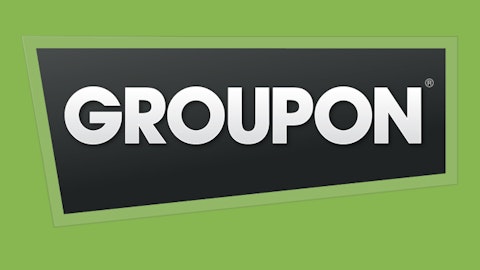When a company IPOs it’s a good idea to examine its business model to ensure that the company, if not already profitable, has a real chance at becoming profitable in the future. Too often, especially with Internet companies, it turns out that the business model isn’t viable in the long term. Investing in a company with a chameleon-like business model is almost never a good idea.
Reviews and food delivery
Online review company Yelp Inc (NYSE:YELP), which had its IPO in early 2012, makes its money from advertising. The website hosts millions of reviews for local businesses and has quickly become the premier review destination. The stock has more than doubled from its IPO price, and the company today is valued at about $2.4 billion.
While Yelp Inc (NYSE:YELP)’s revenue has grown quickly over the past few years the company has yet to turn a profit, leading to a questioning of the viability of the business model. Yelp posted a loss of $19 million in 2012, worse that the $17 million loss from the year before. It seems that the company is aware of this, though, because this week it officially launched the Yelp Platform. The Yelp Inc (NYSE:YELP) Platform allows visitors to the site to purchase services directly through Yelp. Initially the platform will feature food delivery and pickup, but in time the company plans to expand to booking reservations at spas, salons, and other local businesses.
This is a necessary move for Yelp Inc (NYSE:YELP). While Yelp may have the largest collection of reviews Google Inc (NASDAQ:GOOG) also has reviews for businesses built into its maps service. And given the popularity of Google Inc (NASDAQ:GOOG) Maps it’s hard to picture Yelp competing in a profitable way.
If you bought the IPO you’ve done fairly well with Yelp Inc (NYSE:YELP), but you were buying a company with no future visibility whatsoever. A business model shift was inevitable, and the company hadn’t and still hasn’t proven that it can turn a profit. The new Yelp Inc (NYSE:YELP) Platform gives it a chance, but it’s far from a sure thing.
The $2.4 billion valuation is incredibly optimistic. The company recorded just $138 million in revenue in 2012, up 66% from the year before but still a small number compared to the market capitalization. Operating expenses rose by 55% in 2012, so if both of these trends continue then the company will eventually turn a profit. The questions are: when and how much?
That’s a difficult question to answer, but one thing is for certain – growth needs to remain extremely high for a long time to justify the valuation. Entering the food delivery business puts Yelp in competition with Grubhub, which boasts more than 1.6 million users, as well as plenty of smaller companies. It’s difficult to judge how successful Yelp will be breaking into this market, and buying the stock today is more of a gamble than anything else.
Daily deal overload
When daily deals site Groupon Inc (NASDAQ:GRPN) IPO’d in late 2011 the company was valued at about $13 billion. The stock has been pummeled since then, at one point falling by 90% from its all time high. Today the company is valued at about $5.8 billion.
Groupon Inc (NASDAQ:GRPN) offers daily deals on its website which when bought give deep discounts on goods and services. While Groupon Inc (NASDAQ:GRPN) is the most well-known daily deals site a slew have popped up since then, including one offered by Amazon.com, Inc. (NASDAQ:AMZN). The problem with this business is that there is essentially no barrier to entry. This makes Groupon Inc (NASDAQ:GRPN)’s position as the leader extremely fragile.
To combat this Groupon Inc (NASDAQ:GRPN) is entering other markets, such as the restaurant reservation business. This market is currently dominated by OpenTable Inc (NASDAQ:OPEN), a company which has actually been profitable since 2009. OpenTable Inc (NASDAQ:OPEN) had revenue of $162 million in 2012 and net income of $24 million. OpenTable Inc (NASDAQ:OPEN)’s success could be the reason why Groupon wants to enter this market, but drawing restaurants away from the OpenTable Inc (NASDAQ:OPEN) platform may be difficult. Unlike the daily deals business I suspect that there is a significant barrier to entry here.
Although Groupon Inc (NASDAQ:GRPN) is on the cusp of profitability its growth has slowed. In Q1 the year-over-year revenue growth was just 7.5%, making the company’s $5.8 billion valuation hard to justify. Success in the reservation business will be difficult, and I doubt it can bring enough growth to justify buying the stock.
Angie’s got some problems
Finding reliable local professionals like plumbers and electricians can be challenging, and Angie’s List Inc (NASDAQ:ANGI) aims to make it easier. The company operates a platform where members can find and hire local professionals which have been determined to be reliable. This removes much of the uncertainty surrounding this type of hiring.
Angie’s List Inc (NASDAQ:ANGI) is losing money at such a rate that it’s unclear how the company will be able to survive much longer. In 2012 the company lost $53 million on $156 million in revenue, and with only about $60 million in cash on the books things need to turn around quickly for the company to survive. The business model, while not a bad idea, doesn’t seem to be working. And, incidentally, Yelp’s new platform may very well directly compete with Angie’s List Inc (NASDAQ:ANGI).
The company is also facing some bad publicity. Just this week a website was launched which claims that Angie’s List Inc (NASDAQ:ANGI) doesn’t screen its vendors and often refers members to felons and risky service providers. It’s unclear whether these accusations are true or how widespread the problems are, but this kind of publicity is the last thing that Angie’s List Inc (NASDAQ:ANGI) needs. If members start leaving then the company will die.
Angie’s List Inc (NASDAQ:ANGI) needs a business model that works, and right now it doesn’t have one. The stock has more than doubled from its 52-week low for reasons beyond me, but the $1.5 billion valuation is ludicrous given the problems at the company.
The bottom line
Investing in companies which are changing their business models is a dangerous game. Without any ability to look ahead 5 or 10 years valuing such companies is next to impossible. The stock prices of these three companies seems to be supported more by hope than by anything real, and it’s hard to justify investing in any of them.
The article The Problem With Troubled Internet Companies originally appeared on Fool.com and is written by Timothy Green.
Timothy Green has no position in any stocks mentioned. The Motley Fool recommends OpenTable. Timothy is a member of The Motley Fool Blog Network — entries represent the personal opinion of the blogger and are not formally edited.
Copyright © 1995 – 2013 The Motley Fool, LLC. All rights reserved. The Motley Fool has a disclosure policy.






